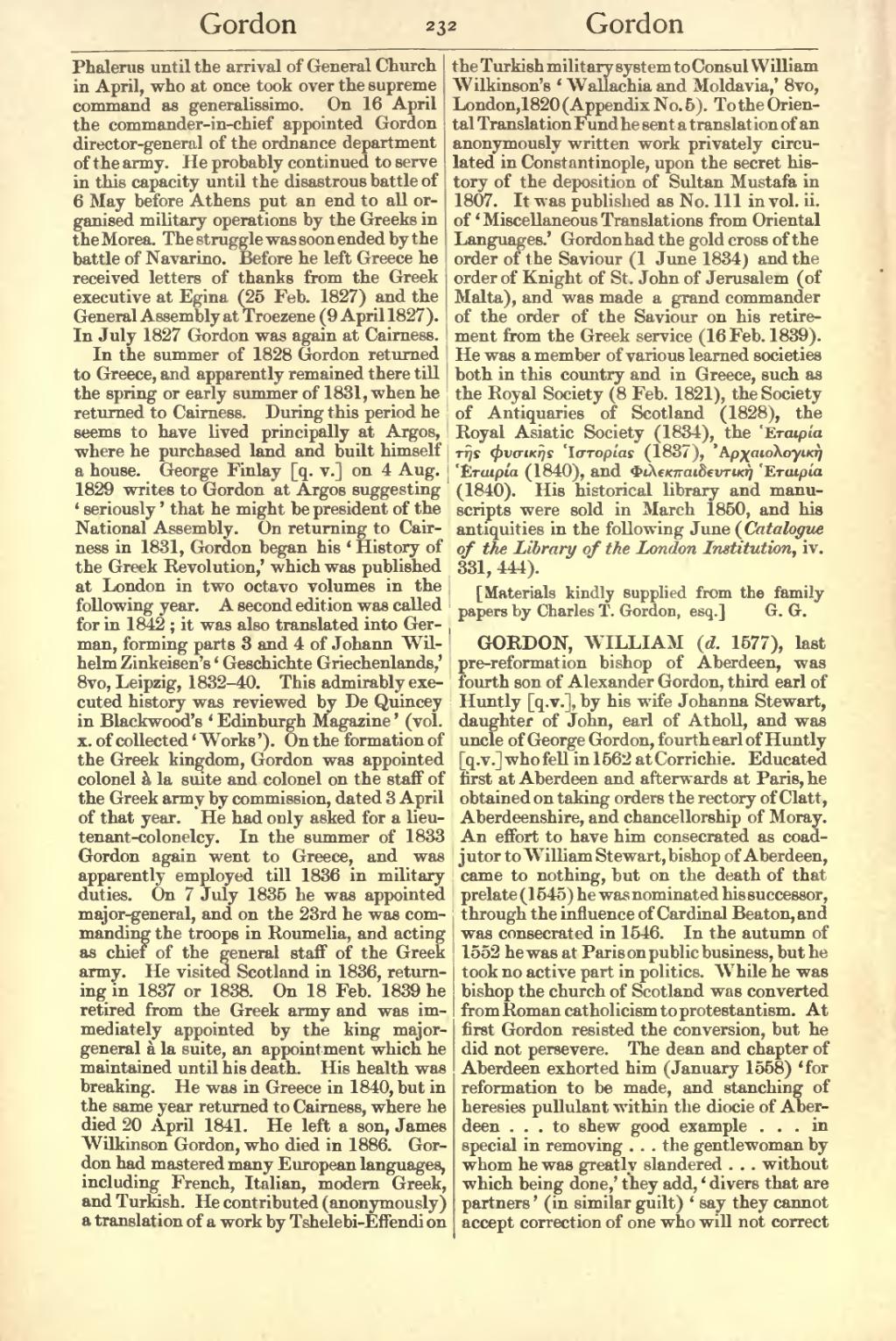Phalerus until the arrival of General Church in April, who at once took over the supreme command as generalissimo. On 16 April the commander-in-chief appointed Gordon director-general of the ordnance department of the army. He probably continued to serve in this capacity until the disastrous battle of 6 May before Athens put an end to all organised military operations by the Greeks in the Morea. The struggle was soon ended by the battle of Navarino. Before he left Greece he received letters of thanks from the Greek executive at Egina (25 Feb. 1827) and the General Assembly at Troezene (9 April 1827). In July 1827 Gordon was again at Cairness.
In the summer of 1828 Gordon returned to Greece, and apparently remained there till the spring or early summer of 1831, when he returned to Cairness. During this period he seems to have lived principally at Argos, where he purchased land and built himself a house. George Finlay [q. v.] on 4 Aug. 1829 writes to Gordon at Argos suggesting 'seriously' that he might be president of the National Assembly. On returning to Cairness in 1831, Gordon began his 'History of the Greek Revolution,' which was published at London in two octavo volumes in the following year. A second edition was called for in 1842; it was also translated into German, forming parts 3 and 4 of Johann Wilhelm Zinkeisen's 'Geschichte Griechenlands,' 8vo, Leipzig, 1832-40. This admirably executed history was reviewed by De Quincey in Blackwood's 'Edinburgh Magazine' (vol. x. of collected 'Works'). On the formation of the Greek kingdom, Gordon was appointed colonel à la suite and colonel on the staff of the Greek army by commission, dated 3 April of that year. He had only asked for a lieutenant-colonelcy. In the summer of 1833 Gordon again went to Greece, and was apparently employed till 1836 in military duties. On 7 July 1835 he was appointed major-general, and on the 23rd he was commanding the troops in Roumelia, and acting as chief of the general staff of the Greek army. He visited Scotland in 1836, returning in 1837 or 1838. On 18 Feb. 1839 he retired from the Greek army and was immediately appointed by the king major-general à la suite, an appointment which he maintained until his death. His health was breaking. He was in Greece in 1840, but in the same year returned to Cairness, where he died 20 April 1841. He left a son, James Wilkinson Gordon, who died in 1886. Gordon had mastered many European languages, including French, Italian, modern Greek, and Turkish. He contributed (anonymously) a translation of a work bv Tshelebi-Effendi on the Turkish military system to Consul William Wilkinson's 'Wallachia and Moldavia,' 8vo. London, 1820 (Appendix No. 5). To the Oriental Translation Fund he sent a translation of an anonymously written work privately circulated in Constantinople, upon the secret history of the deposition of Sultan Mustafa in 1807. It was published as No. 111 in vol. ii. of 'Miscellaneous Translations from Oriental Languages.' Gordon had the gold cross of the order of the Saviour (1 June 1834) and the order of Knight of St. John of Jerusalem (of Malta), and was made a grand commander of the order of the Saviour on his retirement from the Greek service (16 Feb. 1839). He was a member of various learned societies both in this country and in Greece, such as the Royal Society (8 Feb. 1821), the Society of Antiquaries of Scotland (1828), the Royal Asiatic Society (1834), the Έταιρία τής Φυσικής Ίστορίας (1837), Άρχαιολογική Έταιρία (1840), and Φιλεκπαιδευτική Έταιρία (1840). His historical library and manuscripts were sold in March 1850, and his antiquities in the following June (Catalogue of the Library of the London Institution, iv. 331, 444).
[Materials kindly supplied from the family papers by Charles T. Gordon, esq.]
GORDON, WILLIAM (d. 1577), last pre-reformation bishop of Aberdeen, was fourth son of Alexander Gordon, third earl of Huntly [q. v.], by his wife Johanna Stewart, daughter of John, earl of Atholl, and was uncle of George Gordon, fourth earl of Huntly [q. v.] who fell in 1562 at Corrichie. Educated first at Aberdeen and afterwards at Paris, he obtained on taking orders the rectory of Clatt, Aberdeenshire, and chancellorship of Moray. An effort to have him consecrated as coadjutor to William Stewart, bishop of Aberdeen, came to nothing, but on the death of that prelate (1545) he was nominated his successor, through the influence of Cardinal Beaton, and was consecrated in 1546. In the autumn of 1552 he was at Paris on public business, but he took no active part in politics. While he was bishop the church of Scotland was converted from Roman catholicism to protestantism. At first Gordon resisted the conversion, but he did not persevere. The dean and chapter of Aberdeen exhorted him (January 1558) 'for reformation to be made, and stanching of heresies pullulant within the diocie of Aberdeen … to shew good example … in special in removing … the gentlewoman by whom he was greatly slandered … without which being done,' they add, 'divers that are partners' (in similar guilt) 'say they cannot accept correction of one who will not correct
